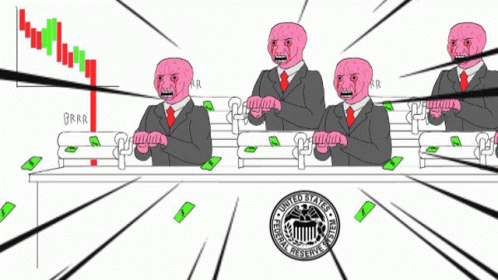Originally published: https://omnifinn.medium.com/can-bitcoin-become-money-aa9a315c887b
What did you learn about money in school? Could you explain money in one sentence? Go on, think about it for a while.
If not, chances are that you don’t understand what or why money is. If you bear with me through this short article, I will do my best to explain it in simple terms. I will also plant helpful links for further study. I should think it’s worthwhile considering the lack of education on money or economics in de-facto educational institutions when you learn the lessons on ”Modern money mechanics” that have become the accepted official narrative when it comes to money. At times it feels like the presumed experts of fiat finance themselves have no idea of how this modern monetary system should function apart from “it works because it works until it doesn’t.” Economic policies are only medicating the symptoms that have root causes too terrible for many to even peek at.
Whether “bitcoin can become money” is somewhat misleading and sidesteps the reality that bitcoin is already money. However, it is crucial to acknowledge that not everyone is equally aware of its value or the concept itself, and bitcoin distribution is far from equal. Those who understand the potential of this new paradigm shift in money find themselves at the precipice of unprecedented power and influence. So read on carefully.
The Need for a New Monetary System
The current monetary infrastructure is deeply flawed (read The Hidden Plunder: Unveiling the Devastating Effects of Inflation). Instead of continuously patching up a broken system through money printing, it may be time to start afresh. While returning to more minor national currencies or reverting to a gold standard might seem unrealistic in our highly globalized world, the rise of the internet and bitcoin has empowered individuals to protect their assets more effectively.
Globalization has increased the cost of monopolizing violence. This means that individuals can now secure themselves better than a nation-state. After all, protection was the critical reason nation-states survived and thrived when it was still cheap to corner the violence market. As interactions increasingly occur in borderless cyberspace, the significance of geographical borders diminishes, paving the way for a limitless yet scarce form of money.
In borderless cyberspace, money is needed that’s limitless (free) but limited (scarce). Now that the option exists, I don’t believe people will settle for anything less.
The Qualities of Money
Before assessing bitcoin’s potential as money, it is crucial to define the essential characteristics of a sound monetary system.
Historically, various items, including favors, objects, and food, have been used as money based on availability and acceptability. However, the need for commodity money arises due to the challenges of international trade, where goods can spoil during transit. Thus, beads, furs, and even decorated stone slabs have been utilized as forms of money.
For supply and demand to ever realistically meet in a global economy, we need money that works as a store of value, a medium of exchange, and a unit of account.
The Emergence of a New Paradigm
Bitcoin’s journey from a game for cryptographer nerds to a digital cash alternative took a significant leap in 2010 when someone valued 10,000 bitcoins, equivalent to two family-sized pizzas.
While nothing possesses intrinsic value, the price of everything is determined by individuals based on their subjective perception of value and marginal utility. The collective actions of individuals within a market form the mechanism that adjusts prices based on countless transactions weaving a delicate balance between ex-ante and ex-post experiences.
[https://bitcoinpizzaindex.net/]

The most essential qualities individuals seek in money include salability, divisibility, durability, and portability. Precious metals have historically fulfilled many of these qualities, making them sovereign money for thousands of years. However, introducing fiat currencies marked the decline of metal money, leading to weak and unsound forms of money. The value of fiat currencies may only wither away with time, the most obvious use case for them being to fund an eternal war that no one could afford in the world of sound money.
Bitcoin is a form of sound money that outperforms traditional fiat currencies in several crucial aspects. It represents the world’s first absolutely scarce resource, offering ease of storage, transferability, divisibility, and high salability across time and space. Despite authoritarian claims and attempts to undermine bitcoin’s legitimacy, individuals choose the money that best suits their needs. Bitcoin is a free form of money that anyone can use, even if it may not be universally adopted.
Additionally, it is essential to recognize that bitcoin is not a virtual currency like the US dollar, as its value is backed by the certainty of mathematics rather than the [volatility of] spoken words.
Interestingly, even though most value transfers are nowadays made in virtual currencies such as the US dollar, metal money was never given up. The central banks hoard gold in their vaults without slowing down, letting their actions speak more accurately than their official definitions of “real money.”
Fiat currency is a cheap knockoff of real money, and the maintenance costs are collected from its users through inflation.

Promises behind these paper notes were broken.
Bitcoin is voluntary money backed by mathematics, whereas fiat currency is forced and backed by promises. Breaking these promises has led, for example, to the situation in Venezuela that it is not even worth it to pick up the paper notes from the sidewalk. This is called hyperinflation, an integral feature in every money or currency whose production is easy to ramp up based on demand.
Gold and bitcoin differ from fiat currencies due to their high stock-to-flow -ratio. This means that to issue a large quantity of new money compared to the existing circulation is difficult, expensive, and in the case of bitcoin, outright impossible outside the immutable open issue schedule.
Counterfeited fiat currency or even gold may be difficult to differentiate from authentic, but counterfeit bitcoin can be detected quickly and automatically by anyone capable of installing computer software on their laptop.
In the central banking system, we rely on bankers to refrain from creating (counterfeiting) too much fiat currency ([that is] [primarily] issued in the form of virtual debt). In contrast, anyone may verify the terms and schedule of new money issuance from the [open-source] code of bitcoin. This information is not openly available in the central banking system, which has caused distrust and, in part, expedited bitcoin’s spontaneous emergence as free, global reserve money.

Given enough time, every fiat note is reduced to its actual practical value.
The global fiat currency experiment is ending
The Bretton Woods agreement, dissolved in 1971, remains relatively unknown to many today, along with its profound consequences. Fiat currencies, despite being widely adopted, cannot be considered sovereign money solely due to their widespread usage. Unlike gold and other metal monies that require significant effort for production, transfer, and counterfeiting, fiat currencies are convenient but lead to hyperinflation.
 Money printer go BRRRRR
Money printer go BRRRRR
Throughout history, excessive money creation has been a temptation for those in control, leading to the Cantillon effect, where the early recipients benefit at the expense of the ordinary consumer. The resulting hyperinflation destabilizes nations and forces individuals to race against losing their purchasing power. Bitcoin offers an alternative by making saving attractive again, redirecting spending toward sustainable investments, and promoting a more prosperous future.
Ultimately, the ordinary consumer will pay the bill of reckless currency printing as the price of goods and services rise. It is the greatest heist in human history.
Mainstream pop economists (Keynesians) see inflation as an essential feature to increase money velocity. Without reckless spending, the economy would grind to a halt, and should the purchasing power of money increase (as it is with bitcoin) instead of decreasing (as it is with fiat currency), people would save their money, and businesses would go bankrupt. Or so goes the story.
Keynesian pop-economist tantalize their audience with rambunctious theories.

There is no denying that consumption would decrease. Then again, it is also a popular opinion that we are living in a world dominated by opulent consumerism with a multitude of issues ranging from global warming to waste management that might just be easier to solve with lower consumption. People would still not entirely stop spending if reckless money creation would end --- the spending would gravitate from malinvestments towards more sustainable investments that are anticipated to yield more significant benefits over time than simply saving the money for later.
In other words, bitcoin makes saving sexy again.
Hyperinflation is not caused only by the gross incompetence of self-proclaimed monetary authorities, even though reckless economic policies surely expedite the activation of a hyperinflationary time bomb. It would be naïve to take confidence in the lie that hyperinflation is an issue limited only to “developing countries.” The fact remains: all fiat currencies have failed and will fail eventually, with no exceptions.
It may even come to pass that the modern age “developing countries” emerge as super states of the information age or perhaps some gathering places for sovereign individuals as hyperinflated geopolitical regions had to adopt bitcoin before other jurisdictions where fiat currency still “works.”
Gold boomers give way to bitcoin millennials
Technological innovations often generate suspicion among older generations but captivate younger individuals eager to challenge established norms. Millennials --- the largest generation in history --- are at the forefront of embracing the digital world. They [favor investing in] bitcoin over gold or real estate, and digital tokens --- like in-game currencies --- are familiar. As we move further into the information age, where individuals can be their banks and generate value independently, bitcoin emerges as a secure means of storing and transferring wealth, impervious to debasement, confiscation, or interference. Once younger generations reach the best earning age, they will likely be interested in free money that can be earned in any way they prefer and be transferred without permission to anyone, anywhere in the world, in seconds, affordably. Like internet youth, bitcoin is also not interested in office hours or public holidays, unlike many bankers.
We are living in the information age where it is possible to be our bank and to produce value for others regardless of physical constraints, earning and spending money that can’t be debased, confiscated, or even stopped.
Either bitcoin goes to the moon or to zero. There is no in-between. (English subs included)
Should you buy bitcoin now?
We can’t begin to imagine what bitcoin is capable of similarly, like we couldn’t predict Netflix while downloading music with Napster. This does not imply that bitcoin wouldn’t have immense utility already today. The capped maximum amount (21 million BTC) and the locked issuance schedule mean that the appreciation of bitcoin is a mathematical fact as long as there is any use, no matter how small the user base.
It is a common misconception that for bitcoin to succeed or to “become money” would require the masses to be interested. Bitcoin has been money for years, and it continues to provide that function in the future for those who want to use it. There is no risk-free investment, and there is no certainty that it will supersede the US dollar as the global reserve currency.
Bitcoin has been money for years, and it will continue to fulfill its function for those who choose to embrace it. Investing in bitcoin can be seen as investing in the monetary infrastructure of the future --- an infrastructure that offers individuals freedom, security, and prosperity. While the upside of bitcoin is virtually limitless, the downside risk is limited to zero. Therefore, considering a non-zero allocation to bitcoin in one’s portfolio seems prudent.
Understanding bitcoin protocol is the surest way to recognize its utility in an increasingly regulated world. Ultimately, the choice of money lies with the individual. Bitcoin presents a compelling alternative for those seeking financial independence and empowerment.
If you remain unconvinced, I recommend thoroughly studying the bitcoin protocol. No value can be assigned objectively. Instead, the individual defines all their values alone. Everyone is free to choose their own money.

